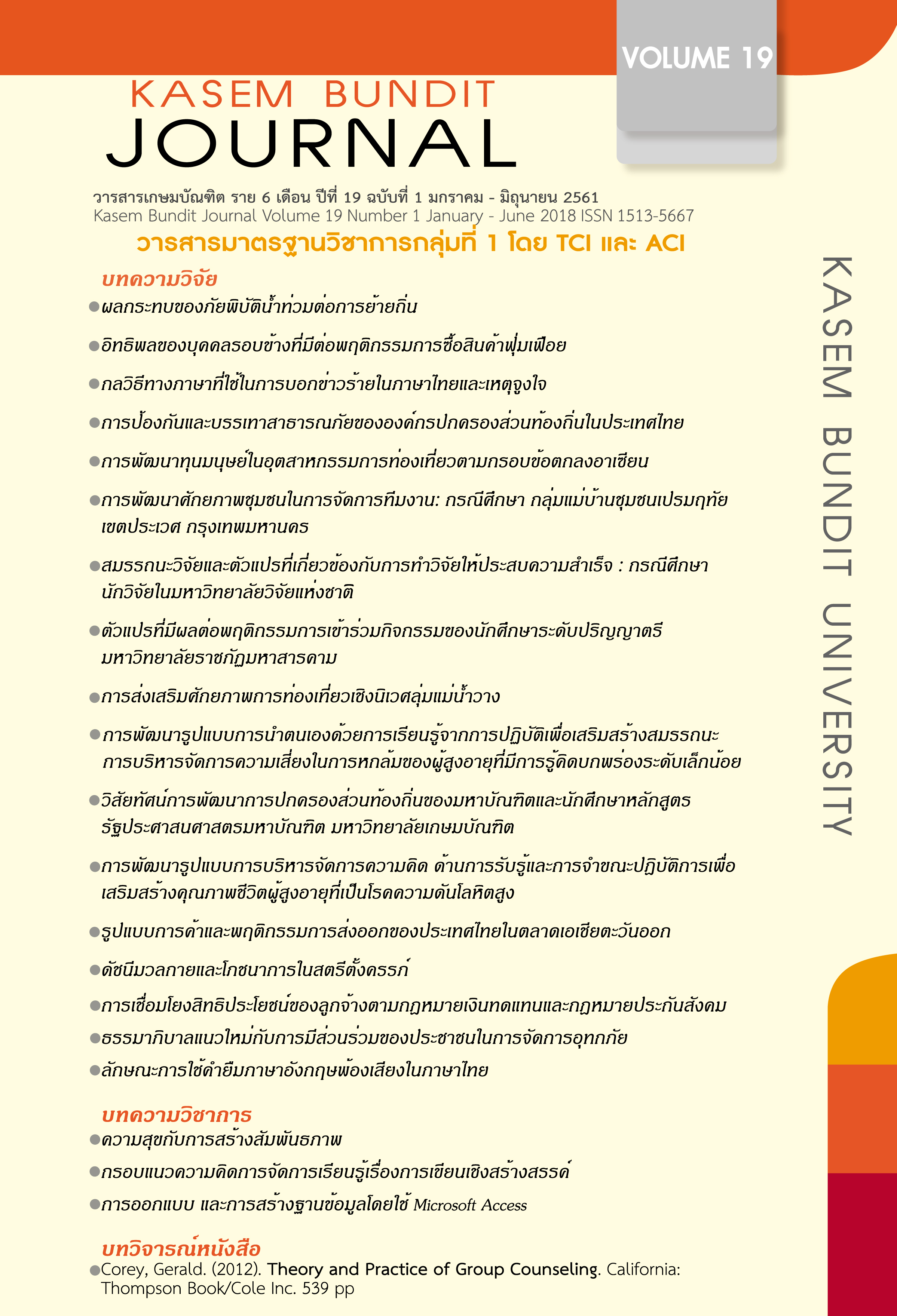Promoting the Potential of Eco-Tourism in Mae Wang River Basin
Keywords:
Ecotourism, participation, community, Mae Wang River BasinAbstract
Thai and foreign tourists were interested in ecotourism as well as cultural heritage and way of life tourism, all of which being positive signs for ecotourism in Mae Wang River basin. The highland people particularly Pga K'nyau (Karen) who had settled here for over 200 years with a low level of education, exhibited a major role and high level of participation in conservation of natural resources which was typically connected with their way of life and farming culture. In promoting the ecotourism, conservation of natural resources and environment, and restoration of local cultures and heritage way of life, strategies of tourism marketing and advertisement are important and should be carried out immediately. Strategic plans for ecotourism development include projects to establish cultural center in Ban Pong Noi Mai, to improve physical environment and facilities for ecotourism in the community, to provide training for community to service the tourism activities, to conserve natural and cultural resources for ecotourism, to develop the strength of the community for the sustainable tourism management, and to advertise and promote the network of eco-cultural tourism. Ecotourism routes comprise Inthanon-Khun Wang-Pong Noi Mai-Mae Win.
References
Buapeng, Janya. (2009). Marketing strategies for ecotourism: trekking and nature study in Phang-Nga. Thesis. Business Administration. Phuket Rajabhat University.
Chantareephe, Waranya. (2010). The impacts of ecotourism management on Ban Sob Win Community, Tambon Mae Win, Wang District, Chiang Mai Province. Thesis. Public Administration. Chiang Mai University.
Chiang Mai Provincial Government Offices. (2017). Information for Chiang Mai. [online]: https://gis.chiangmai.go.th/ [Retrieved: November 27th, 2017].
Choochart, Choosit., Watanaleaungarun, Voraphon., Kalanthapakorn, Khattiya., Yanamoto, Kanyapak., Tantrasin, Nanthiya., Saengthong, Kritch., Yacharoen, Monvipa., and Sriamorn, Praprasiri. (2005). An Ecotourism Model for the Mae Taeng River Area. Full Research Report. Chiang Mai Rajabhat University.
Fennell, David A. (1999). Ecotourism: an Introduction. London : John Wiley & Sons, Ltd. and ERP Environment.
Kongphermphoon, Adisorn. (2000). Karen hilltribe’s attitude towards wildlife and forest resource conservation at Omkoi wildlife sanctuary. Thesis. Agricultural Extension. Chiang Mai University.
Maneenater, Thirachaya. (2008). The Imapact of Tourism to Local Community in the Area of Phi Mai Historical Park. Full Research Report. Khon Kaen University.
National Statistical Office. (2015). Tourism. [online]: https://www.nso.go.th/ [Retrieved: June 18th, 2017.
Sitthisuntikula, Katesuda. Punyawadeea, Varaporn., and Yossuck, Pradtana. (2016). The role of local administrative organizations in encouraging forest conservation by local communities in Chiang Mai Province. Journal of Environmental Management. Vol.12, No.1. pp.30-45.
Srisawan, Waranyaphorn. (2007). Impact of ecotourism and recreation activities in Mon Phrayachae Forest Park, Lampang province. Thesis. Recreation and Tourism Management. Maejo University.
Supparatvikorn, Suthee. (2005). Birds of Doi Inthanon. Bangkok: Birder’s Journal.
Thiangtham, Tipphanna. (2007). Cultural Changes of Hill-tribe Communities Resulting from Tourism: A Case Study of Roummit Village, Mae Yao Sub-district, Muang District, Chiang Rai Province. Thesis. Master of Arts in Development Administration. Maejo University.
Thongpromwanich, Supawinee. (2005). Facilitating Process for Community-Based Tourism Management: Mong Community Houy Namrin Village and Chiang Daow Village, Chiang Mai Province. Proceedings of 43rd Kasetsart University Annual Conference. Kasetsart University. Bangkok. pp. 376-383.
Visavateeranon, Ampawan., and Wibulma, Siriwan. (2016). Strong communities for creating communities sustainability in bangkok metropolitan : success indicators and lessons in community. Srinakharinwirot Research and Development. Journal of Humanities and Social Sciences. Vol.8, No. pp.182-194.
Watershed Conservation and Management Office. (2004). Project of Village-Based Watershed Ecology Protection. (copy).
World Tourism Organization (2017). Sustainable Development of Tourism. [online]: https://sdt.unwto.org/. [Retrieved: January 16th , 2017].
Yamane, Taro. (1973). Statistics: An Introductory Analysis. 3rd edition. Newyork : Harper and Row Publication.
Yossuck, Pradtana., and Panyadee, Chalermchai. (2002). Impact of Ecotourism on Rural Communities and Household in Northern Thailand. Full Research Report. Maejo University.
Downloads
Published
How to Cite
Issue
Section
License
ทัศนคติ ความคิดเห็นใด ๆ ที่ปรากฏในวารสารเกษมบัณฑิตฉบับนี้เป็นของผู้เขียน โดยเฉพาะ มหาวิทยาลัยเกษมบัณฑิตและบรรณาธิการ ไม่จำเป็นต้องมีความเห็นพ้องด้วย







